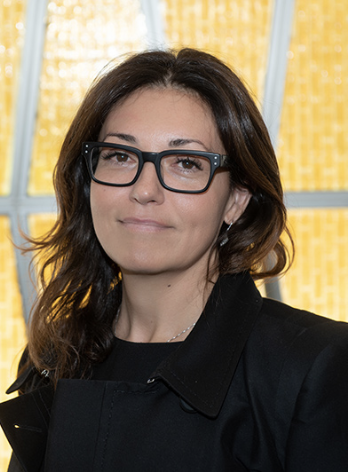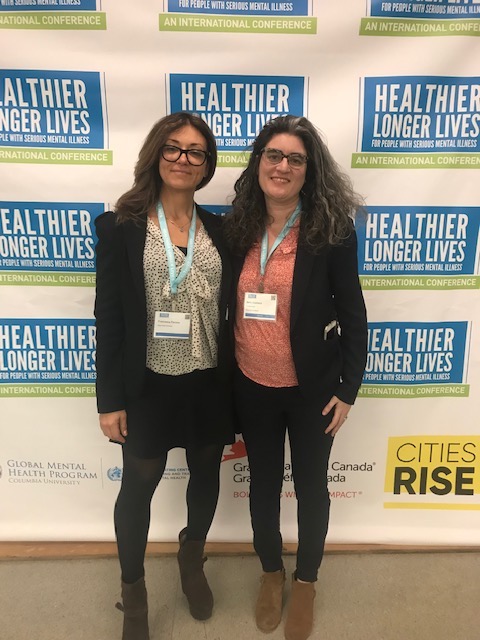Researcher finds relationships are at core of clubhouses and CrossFit

When Francesca Pernice, associate professor of educational psychology and director of counseling psychology in the Division of Theoretical and Behavioral Foundations in the College of Education at Wayne State University, began learning about clubhouses in the early 90s, she was astounded.
"I was recruited to study consumers' transitions from psychiatric day hospitals to the community recovery program referred to as 'clubhouses,'" she said. "I witnessed something I was never taught - people with schizophrenia who were working and engaged. They were experiencing something that was starting to come on the scene in mental health - recovery from schizophrenia."
These days, Pernice focuses her efforts on researching and raising awareness about the Fountain House clubhouse model - a community-based recovery program nested within psychiatric rehabilitation principles that helps individuals living with serious mental illness regain their identity, independence and dignity while providing them with a place to belong and experience a sense of community.
"My whole impetus for doing this research was to really give back to the 'members' in the clubhouse community," she said. "I felt the need to write about, study and bring it into the literature more. When you find something that works, you want to understand how it works. It has been a great journey."
According to Pernice, the first clubhouse began as a reaction to long-term hospitalization, and most people who sought them out had schizophrenia or bipolar disorder.
"Hospitalizing people for long periods of time was found to be inhumane and unnecessary," she said. "Medication helped people deal with some symptoms, but there is a lot of stigma associated with mental illness, so people ended up on the fringes of society. Nothing in the community provided a safe haven for people to make friends, connect and find a way to be included in the larger society."
A group of patients who had been discharged from psychiatric hospitals met to generate ideas for integrating themselves back into their communities. They provided one another with ongoing support and, with assistance from others, purchased a building in New York's Hell's Kitchen neighborhood that became known as Fountain House. Today, the organization - which Pernice says is probably the premiere clubhouse in the world - helps individuals with mental illness recover by providing opportunities for members to live, work and learn while contributing their talents through a community of mutual support.
Through her research, Pernice has found that clubhouses - which are run primarily by members in partnership with a few staff referred to as social practitioners - offer numerous benefits. In addition to helping members build social relationships, clubhouses equip them with skills they need to return to work, help them feel connected to the community, and promote an attitude of recovery and self-care. Pernice's studies demonstrate that family members of individuals with mental illnesses even report experiencing less stress and depression, improved relationships with their relatives, and the ability to discuss issues other than problem-solving and illness with their loved ones.
"Having loved ones engaged in something that is helping them develop their own identity helps family members feel less burdened," said Pernice. "It allows family members to get on with their lives too."
Clubhouses may also provide advantages for communities.
"Clubhouses are increasingly becoming more like community centers or well-being centers for people who may not have a strong network," she said. "They offer community programming. They can also help prevent homelessness by assisting mentally ill individuals with identifying housing opportunities."
Pernice said Michigan played an important role in the success of clubhouses.
"Clubhouse Michigan (a coalition of clubhouses) has the largest number of clubhouses in the country," she said. "A great group of people has worked hard to develop clubhouses with high standards and great outcomes."
Pernice's work pushes her to ask new questions, mainly about how to replicate the model. She said the 300 clubhouses worldwide share the same philosophy, which is critical.
"Social relationships are at the heart of the clubhouse model," she asked. "How do they propel us forward, keep us healthy, promote recovery and prevent relapse?"
 Other questions involve identifying leadership characteristics of clubhouse executive directors, finding key elements for a creating a community of recovery and making the model innovative for young adults. Most people involved in clubhouses are in their early 30s to mid-40s, and Pernice hopes to get people diagnosed and into meaningful roles through education and career opportunities provided in a community of support at younger ages.
Other questions involve identifying leadership characteristics of clubhouse executive directors, finding key elements for a creating a community of recovery and making the model innovative for young adults. Most people involved in clubhouses are in their early 30s to mid-40s, and Pernice hopes to get people diagnosed and into meaningful roles through education and career opportunities provided in a community of support at younger ages.
Studies show people living with serious forms of mental illness often die 10 to 20 years earlier because of physical health comorbidities that can complicate their mental health conditions. Pernice said developing a community approach to a system of care has been one global solution for addressing serious mental health, and Fountain House recently hosted an international conference in collaboration with the World Health Organization and other partners to discuss solutions to these challenges.
A CrossFit enthusiast, Pernice sees similarities between her chosen form of exercise and her research, noting that the key element is the sense of community.
"In clubhouses, the 'work-ordered day,' or WOD, is where people come together and figure out what needs to get done. In CrossFit, we have a 'workout of the day,' which uses the same acronym, and we complete a fitness routine," she said. "In both cases, people do it together so no one feels alone, they come at whatever level they are on, and they support one another. And, they return because they develop mutually obligatory relationships."
"I go to CrossFit every day because I don't want to let my team down. That is one of the key things I see in clubhouses," she continued. "Members see others who were in their position growing and achieving and develop the confidence and motivation to keep pushing themselves."
Pernice said she does not view clubhouses through a lens reserved only for those who are mentally ill; instead, she looks at them as a way of thinking about health and human development.
"Ultimately, it is about people getting together to do something meaningful," she said. "You can walk into any clubhouse in the world, and you will be welcome. The same thing applies to CrossFit. A sense of community is at the heart of getting and staying healthy."
by Tracy A. Walker